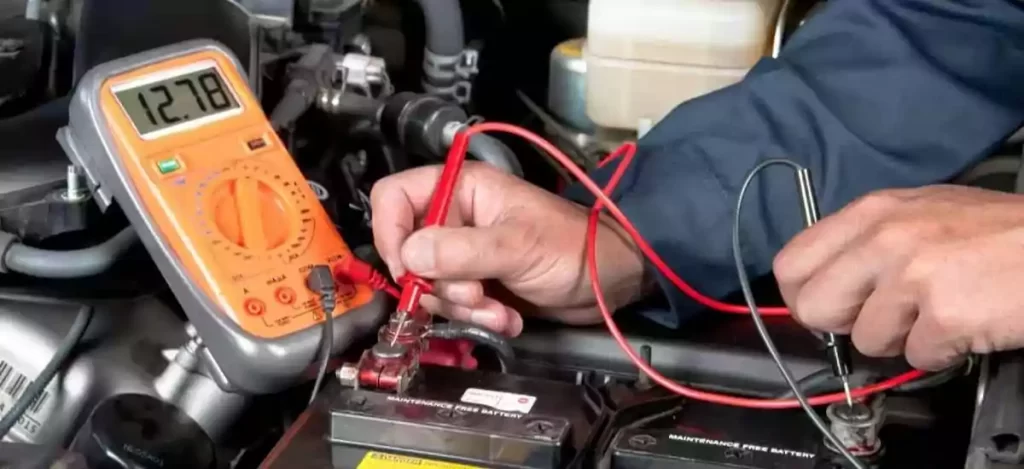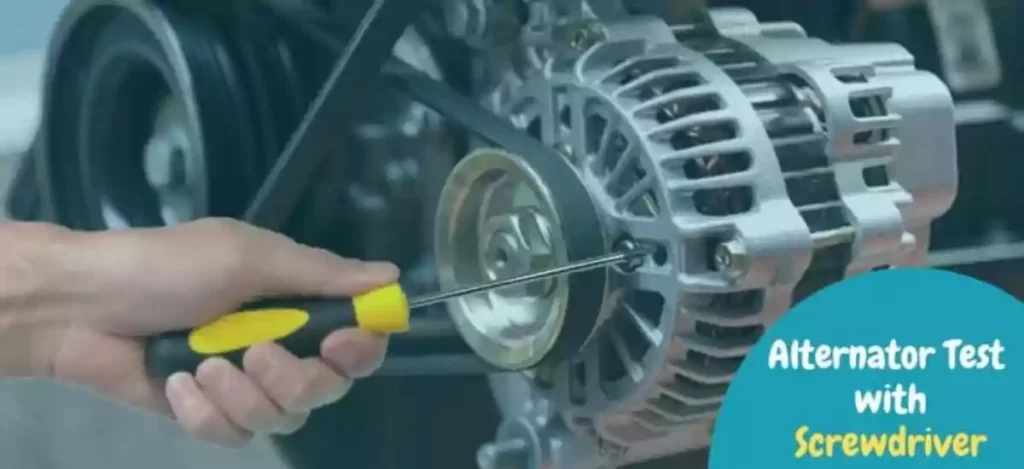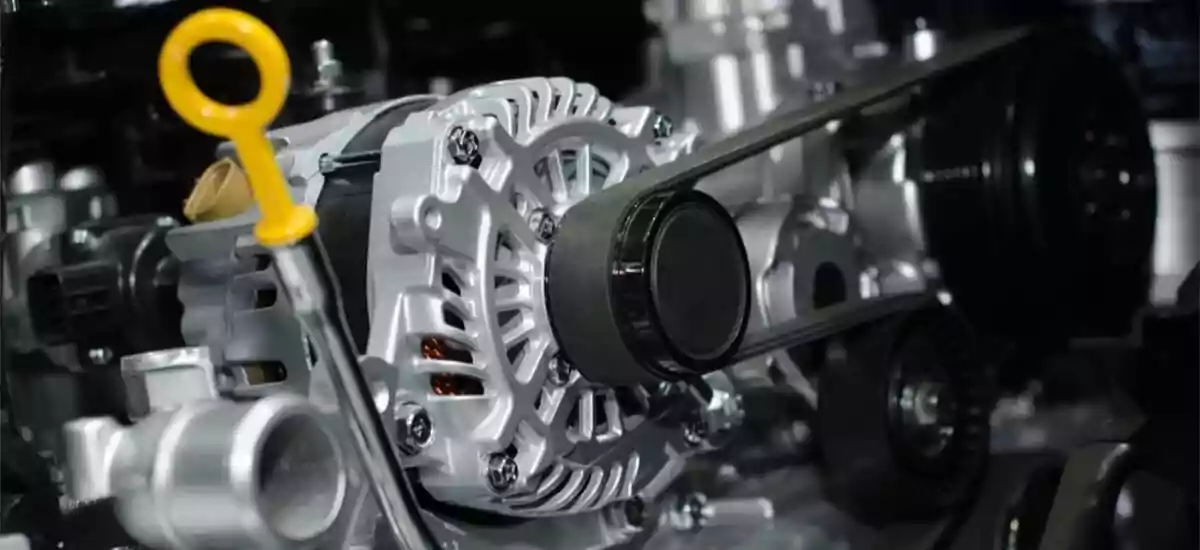Being doubly sure about your vehicle when you are going on a road trip. Or making sure your vehicle doesn’t break down suddenly when you are using it daily, is a must, isn’t it? But how to test an alternator off the car? And when we talk about vehicle safety checking its alternator is an excellent idea to stay away from any kind of vehicle breakdown.
Well, here’s a mini-guide for you to know all the best ways of how to test an alternator off the car. Have a thorough look!
How To Test An Alternator Off The Car?
Before spilling the beans on the main information, here’s a little piece of advice or tip for you. Just use a voltmeter or multimeter to conduct a safe and simple test of the alternator instead of disconnecting the negative battery cable.
This is because this method will be more effective and less complicated. And now, before we jump towards our main question i.e., how to test an alternator off the car, let us give you the list of tools that you will need to do the testing.

Tools required:
- Voltmeter or Multi-meter
- A standard set of sockets and wrenches depending upon the car you drive.
- The toolkit you always carry in your car as an additional safety measure.
And now, we will discuss multiple ways to do the testing, starting with:
Test An Alternator Off The Car?
Simply start with checking your car’s battery voltage by using a multi-meter. Now the question is how to test alternator without multi-meter, right?
- Firstly, just shut off your car and touch the multi-meter prongs to the terminals,
- Now, note the number of volt range flashing on the screen. It should be either 12, 13, or something close.
- Then, second thing is to start the car and note the volt range again while the car is running. It should be above 13.
- If the number has successfully been increased, then it will tell you that the alternator or the car is producing voltage.
- But if the volt range stays constant or drops after turning on the engine. It is a clear sign that the alternator is faulty.
And that is how to test alternator with engine off.
But while this is just one method. There are more methods for Testing Your Alternator with the Car Engine Off. And the one mentioned below evolves the voltmeter. Have a look!
Test Alternator When Car Won’t Start
In the car doesn’t start and you are wondering, how to test alternator when car won’t start?
Here is what needs to be done!
- Start with doing the multi-meter test with the car’s engine off and then when you have to do the testing to know whether the alternator is working or not.
- Do it by jumpstarting your broken car and keeping your vehicle running. Do the required testing and take your digits from the multi-meter to know the root cause of the problem.
And that are some of the ways in which a multi-meter helps you with how to bench test an alternator off the car. But the guide doesn’t end here as there are more details that you need to know yet. Continue reading to find, How to test alternator with Screwdriver.
Common Mistakes to Avoid
When testing an alternator, people often make some common mistakes that can lead to inaccurate results or even damage to their vehicle. Here are some frequent errors and how to avoid them:
- Disconnecting the Battery: Some people disconnect the battery to test the alternator. This can damage the vehicle’s electrical system. Instead, use a voltmeter or multimeter.
- Using the Wrong Tools: Using tools that are not designed for automotive use can give inaccurate readings. Always use a proper automotive multimeter or voltmeter.
- Not Checking the Battery First: The battery should be tested first to ensure it’s not the source of the problem. A weak or dead battery can affect the alternator test.
- Ignoring Safety Precautions: Always wear protective gear and ensure the engine is off and cool before starting any tests.
- Incorrect Placement of Probes: Placing the multimeter probes incorrectly can give wrong readings or cause sparks. Follow the instructions carefully.
Alternator Maintenance Tips
Keeping your alternator in good working condition is crucial for the overall health of your vehicle. Here are some best practices:
- Regular Inspections: Check the alternator regularly for signs of wear or damage, such as frayed wires or loose connections.
- Clean Connections: Ensure the battery terminals and connections are clean and free from corrosion. Dirty connections can affect performance.
- Drive Regularly: Regular driving helps keep the alternator in good shape. Short trips don’t give the alternator enough time to recharge the battery fully.
- Avoid Overloading: Don’t overload your vehicle’s electrical system with too many accessories, as this can strain the alternator.
- Listen for Noises: Unusual sounds like grinding or whining from the alternator area can indicate a problem. Have it checked by a professional if you hear these noises.
Troubleshooting Other Electrical Issues
Sometimes, problems with your vehicle might seem like they’re caused by the alternator, but other electrical issues could be the culprit. Here’s how to determine if other problems are causing issues:
- Check the Battery: Ensure the battery is fully charged and in good condition. A bad battery can mimic alternator problems.
- Inspect the Wiring: Look for any damaged or loose wires in the electrical system. Faulty wiring can cause intermittent electrical problems.
- Test the Starter: A failing starter can cause issues that seem like alternator problems. Ensure the starter is working correctly.
- Look at Fuses: Blown fuses can disrupt the electrical system. Check the fuse box for any blown fuses and replace them if necessary.
- Monitor Electrical Accessories: If certain accessories (like lights or the radio) are malfunctioning, they might be drawing too much power or have their own issues.
Test Alternator With Screwdriver
This one is quite easy yet a foolproof method of getting the result you have been looking for, i.e., whether or not the alternator has gone bad?

- Start with simply touching the tip of your screwdriver’s blade to the alternator nuts located near its pulley. This will allow you to the feel magnetism of the alternator that attracts the screwdriver.
- Well, if this happens, it means that your car’s alternator is working just fine and you don’t have to worry about anything.
- But in case you don’t feel strong magnetic energy pulling the screwdriver towards the alternator, you must conclude that the alternator might have a problem.
- And after knowing about all these varieties of alternator tests, you must also know about the alternator diode test as this knowledge can come in hand too.
- The alternator diodes test helps you to know the condition of your car’s alternator as they are the common cause of alternator failure.
- Just check for missing ripples or excessive ripples in the diode. Or the presence of tails, spikes, and any other irregular patterns as they are also a sign of bad diode.
Before we conclude our information, below are some frequently asked questions with their answers to enhance your knowledge on this topic. Don’t miss them out.
Frequently Asked Questions
Here are the questions that people ask several times while dealing with or finding out their faulty car alternator.
Q1. Can you test an alternator off of a vehicle?
Ans. Yes, you surely can! And we have discussed some of the ways of doing so in the information provided above. Have a thorough look at it and fetch your answer from there.
Q2. How can I test my alternator at home?
Ans. All the methods provided above are self-analysis or methods tries at the home garage to know whether the alternator of the car is fine or not. In case the methods are not giving you proper results or if you are not confident about how to do the testing, you can always turn towards professional help and get the work done by them.
Q3. How do you bench test an alternator with a multimeter?
Ans. To know the answer, see the section where we have mentioned testing an alternator with the multi-meter. You will get detailed steps along with the knowledge of the condition of the alternator. That tells whether your alternator is fine or not.
And that’s all about knowing how to test an alternator off the car. Now do the testing and get the results.
To Sum Up:
Before asking for expert help, people like to test things on their own. Especially when it’s about their car. And so, you must know all the best ways of how to test an alternator off the car, to deal with such situations on your own, and get the result that you are seeking.

